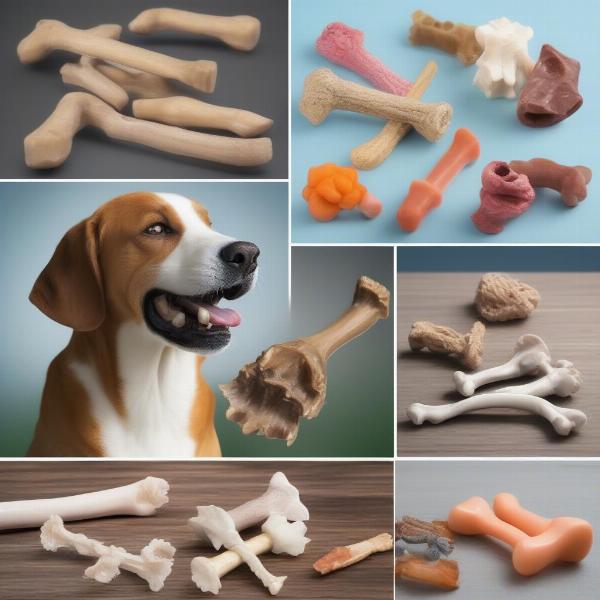Beef bones are a popular treat for dogs, offering a satisfying chew and potential dental benefits. However, not all beef bones are created equal, and some can pose serious health risks. This comprehensive guide will explore the benefits and risks of giving your dog beef bones, helping you make informed decisions to keep your furry friend safe and happy. We’ll cover everything from selecting the right type of bone to recognizing potential hazards.
Choosing the Right Beef Bone for Your Dog
Not all beef bones are safe for dogs. Cooked bones are a definite no-no, as they can splinter and cause internal injuries. Raw bones are generally safer, but choosing the right type and size is crucial. Opt for large, meaty bones like knuckle bones, marrow bones, and rib bones. These are less likely to splinter and provide a longer-lasting chew. Avoid weight-bearing bones like leg bones, as these are denser and more prone to fracturing teeth. The size of the bone should be appropriate for your dog’s size and chewing habits. A small dog should not be given a large bone that they could potentially choke on.
The Benefits and Risks of Dog Beef Bone
Chewing on beef bones can provide several benefits for your dog, including:
- Dental health: Chewing helps scrape away plaque and tartar, promoting healthy teeth and gums.
- Mental stimulation: Gnawing on a bone can keep your dog entertained and prevent boredom.
- Nutritional value: Raw beef bones contain essential nutrients like calcium and phosphorus.
However, there are also risks associated with giving your dog beef bones:
- Splintering: Cooked bones can easily splinter, causing damage to the mouth, throat, stomach, and intestines.
- Tooth fractures: Chewing on extremely hard bones can lead to broken teeth.
- Choking hazard: Small bone fragments can become lodged in the throat, posing a choking risk.
- Constipation: Ingesting too much bone can cause constipation.
Supervising Your Dog While Chewing Beef Bones
Supervision is key when giving your dog a beef bone. Never leave your dog unattended with a bone, and always monitor them for signs of distress or choking. Remove the bone once it becomes small enough to be swallowed.
Alternatives to Dog Beef Bone
 Dog Beef Bone Alternatives
Dog Beef Bone Alternatives
If you are concerned about the risks of beef bones, several safe alternatives can provide similar benefits. These include:
- Dental chews: Specifically designed to promote dental health.
- Rubber toys: Durable and provide a satisfying chew.
- Bully sticks: Made from dried beef pizzle, a natural and digestible chew.
Conclusion: Safe Chewing Practices for a Happy Dog
Providing your dog with appropriate chew toys, like carefully selected raw beef bones or safe alternatives, can contribute to their overall well-being. Remember to prioritize safety by choosing the right type and size of bone, supervising your dog while they chew, and removing the bone when it becomes too small. By following these guidelines, you can help ensure a safe and enjoyable chewing experience for your furry friend.
FAQ:
- Are cooked beef bones safe for dogs? No, cooked beef bones are dangerous and should never be given to dogs. They can easily splinter and cause internal injuries.
- What types of raw beef bones are safest for dogs? Large, meaty bones like knuckle bones, marrow bones, and rib bones are generally safer than weight-bearing bones.
- How long should I let my dog chew on a beef bone? Supervise your dog and remove the bone once it becomes small enough to be swallowed.
- What are some signs that my dog is having trouble with a beef bone? Signs of distress include choking, gagging, excessive drooling, and vomiting.
- What should I do if my dog swallows a bone fragment? Contact your veterinarian immediately.
- Can puppies chew on beef bones? Yes, but ensure the bone is appropriately sized and always supervise them.
- Are there any breeds that shouldn’t have beef bones? Dogs with strong jaws and aggressive chewing habits might be more prone to breaking teeth on hard bones. Consult your vet for advice specific to your breed.
beef bone broth for dogs recipe
ILM Dog is a leading online resource for dog owners worldwide, dedicated to providing expert advice and practical tips on all aspects of dog care and wellbeing. From breed selection to health and nutrition, training and behavior, grooming, and product recommendations, we offer comprehensive guidance to help you nurture a happy and healthy canine companion. For personalized advice or to learn more about our services, contact us at [email protected] or call us at +44 20-3965-8624. Visit ILM Dog today for all your dog care needs.